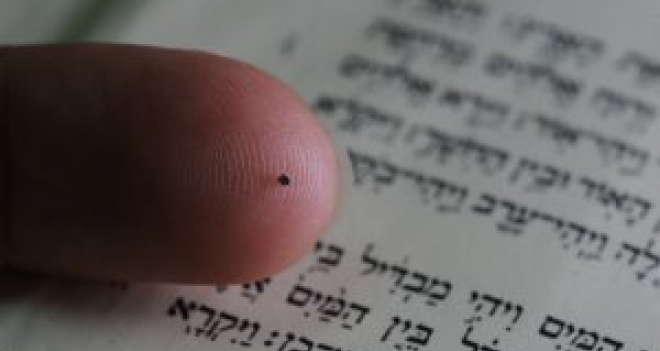From the Technion to Space
At the end of March, Israeli astronaut Eytan Stibbe will set off for the International Space Station ....
At the end of March, Israeli astronaut Eytan Stibbe will set off for the International Space Station as a member of the Ax-1 crew and as part of the Rakia mission. Stibbe will take with him the Nano Bible - developed and produced at the Technion - and don
Astronaut Eytan Stibbe will take with him a copy of the Nano Bible, developed at the Technion - Israel Institute of Technology, to the International Space Station. The unique technological item was lent to him by the Israel Museum in Jerusalem, where it is currently on display in the Book Hall alongside the Dead Sea Scrolls. Stibbe will take off into space at the end of the month as a member of the Ax-1 crew and as part of the Rakia mission.
The Nano Bible is the most innovative and smallest copy of the Bible in existence. Technion scientists engraved the 1.2 million letters of the Bible on a gold-plated layer of silicone (on a surface the size of a grain of sugar) by means of a focused ion beam. The ancient text on the chip can only be read using a microscope capable of 10,000 times magnification. While creating the Nano Bible, Technion researchers sought to demonstrate the wonders of miniaturization and how this ultimate modern-day miniaturization can be used.
The idea of miniaturizing the Bible was conceived in 2007 by Professor Uri Sivan, now president of the Technion, and Dr. Ohad Zohar of the Russell Berrie Nanotechnology Institute (RBNI), as part of an educational program intended to increase young people’s interest in nanotechnology. The production of the chip and development of the software that allows engraving to be carried out was developed by engineers in the Zisapel Nanoelctronics Center (MNFU) at the Technion.
"The Bible is the oldest and most important text for the Jewish people and one of the most important for the entire world. It’s a cornerstone of human culture," said Technion President Prof. Uri Sivan. "The Nano Bible being taken into space connects distance and time, the past and the future, and ancient human culture with modern technology."
Eytan Stibbe: "The Nano Bible that I’ll take to the International Space Station symbolizes harmony between groundbreaking technology and respect for our heritage as humanity. Creating a copy of this ancient text, using innovative technology, allows us to look into the future with hope while remembering our past. I'm looking forward to the opportunity to look at this technological marvel as I float in space."
for the full article, click here
(photographed by Nitzan Zohar, Technion Spokesperson)



